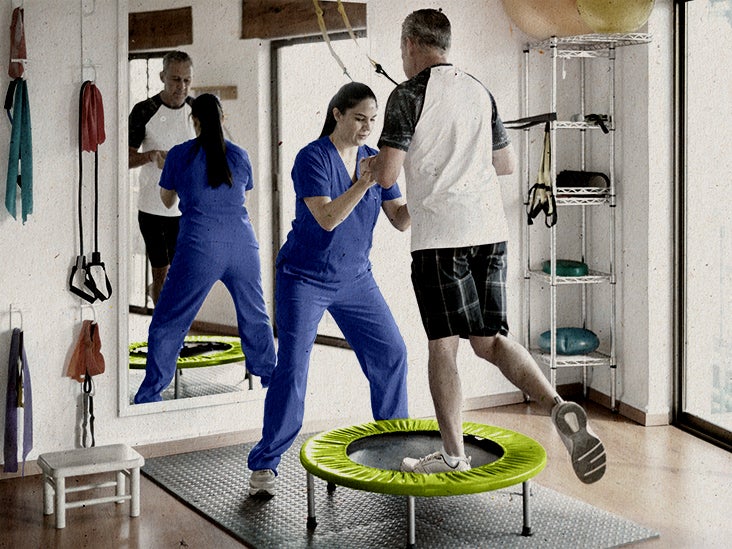Quality in Orthopedics Roanoke: Comprehensive Solutions for a Healthy And Balanced Way of life
Quality in Orthopedics Roanoke: Comprehensive Solutions for a Healthy And Balanced Way of life
Blog Article
Recognizing the Role of Physical Therapists in Sports Medicine
Understanding the role of physical specialists in sporting activities medication is essential for professional athletes and medical care specialists alike. Physical therapists play an important function in assessing professional athletes' problems and injuries, establishing personalized therapy plans, and applying recovery methods. Their know-how expands beyond injury healing, as they additionally concentrate on improving performance and avoiding future injuries. Working together with medical care experts and trainers, physical therapists offer comprehensive like professional athletes, guaranteeing their total health and optimal efficiency. With their comprehensive understanding and abilities, physiotherapists are important members of the sports medication group, working in the direction of the usual goal of keeping athletes healthy and aiding them reach their complete possibility. This short article intends to clarify the vital role that physical specialists play in sports medication, highlighting their contributions to the field.

Examining Athlete's Injuries and Conditions
Physical therapists in sports medication play a critical duty in assessing athletes' conditions and injuries. The ability to precisely assess a professional athlete's injury is crucial in figuring out the proper training course of therapy and rehab.
During the evaluation, physiotherapists collect vital info such as the athlete's case history, previous injuries, and current signs. They likewise perform a thorough checkup, assessing elements such as variety of motion, flexibility, strength, and security (physical therapists Roanoke). Special diagnostic examinations and imaging might additionally be used to more assess the injury or condition
By conducting this detailed evaluation, physical specialists have the ability to accurately identify the injury and establish a personalized therapy strategy. This might consist of restorative workouts, manual treatment techniques, and methods such as warm or cool therapy. In addition, physiotherapists supply education and learning and assistance on proper methods for stopping future injuries, along with methods for enhancing efficiency and reducing the danger of re-injury.
Creating Personalized Therapy Plans
Physiotherapists in sports medicine establish tailored treatment plans based on their comprehensive evaluation of an athlete's conditions and injuries. This procedure involves a detailed understanding of the professional athlete's case history, checkup, and diagnostic tests. By gathering this information, the physical specialist can determine the underlying root causes of the injury or problem and determine one of the most appropriate program of treatment.
The personalized treatment plan intends to resolve the particular demands of the professional athlete and promote optimum recuperation. It may consist of a combination of therapeutic workouts, manual therapy methods, techniques such as warmth or chilly therapy, and education and learning on injury prevention. The physiotherapist will certainly also think about the professional athlete's objectives, sport-specific needs, and timeline for go back to play when creating the therapy strategy.
Additionally, the therapy plan may evolve over time as the professional athlete advances in their rehabilitation. Normal re-evaluations enable the physical specialist to examine the performance of the interventions and make any needed alterations. The supreme goal is to facilitate the professional athlete's safe go back to their sporting activity while decreasing the risk of re-injury.
Carrying Out Rehabilitation Strategies
The application of rehab methods plays a crucial role in the treatment process for athletes in sports medication. These techniques are made to aid athletes recuperate from injuries, boost their performance, and prevent more injury. Physiotherapists, as experts in motion and feature, are in charge of applying these methods and guiding professional athletes with their recovery trip.
One of the vital facets of executing rehabilitation techniques is the analysis of the athlete's problem. Physical therapists review the athlete's injury or problem, taking into consideration factors such as the extent of the injury, the professional athlete's goals, and their existing degree of fitness. Based on this analysis, the therapist establishes a personalized treatment plan that consists of details rehab strategies.
Rehabilitation techniques can include a variety of interventions such as healing exercises, manual therapy, modalities (e.g., warm, cool, electrical excitement), and practical training. These strategies are customized to deal with the athlete's specific needs and goals, aiming to bring back ideal function, minimize discomfort, and enhance efficiency.
Throughout the rehab process, physical therapists closely check the professional athlete's progression and make any kind of needed adjustments to the therapy strategy. They additionally offer education and advice to the athlete on appropriate form, injury prevention methods, and self-care techniques.
Enhancing Performance and Avoiding Injuries
An important aspect of the physical specialist's function in sporting activities medication is boosting efficiency and preventing injuries with targeted interventions. Physical therapists play an essential function in maximizing athletes' performance and minimizing the threat of injuries by utilizing different strategies and techniques.
To boost performance, physiotherapists function very closely with athletes to develop personalized workout programs that focus on enhancing stamina, endurance, versatility, and equilibrium. physical therapy Roanoke. These programs are created to resolve specific locations of weakness or limitation, permitting professional athletes to reach their complete possibility. Additionally, physiotherapists may employ strategies such as hands-on therapy, including joint mobilization and soft tissue mobilization, to maximize athletes' motion patterns and improve general efficiency

Teaming Up With Healthcare Professionals and Coaches
Cooperation with health care experts and trains is vital for physical specialists in enhancing professional athlete efficiency and protecting against injuries in the area of sports medicine. physical therapists Roanoke. Physiotherapists play a vital role in the multidisciplinary group that supports athletes, and effective partnership with various other specialists is crucial for delivering thorough care
When working with medical care professionals, physical specialists team up very see here now closely with doctors, orthopedic doctors, and sports medicine professionals. This partnership permits for far better therapy, analysis, and medical diagnosis planning for athletes. By sharing their expertise and understanding, physical specialists can contribute valuable understandings and perspectives to the group, making sure the very best possible results for athletes.
Furthermore, collaboration with instructors is crucial for physiotherapists to design and execute reliable training and conditioning programs. Coaches offer useful info regarding the certain needs and objectives of the sport, in addition to the professional athlete's training timetable and efficiency assumptions. By collaborating, physiotherapists and trainers can create customized programs that resolve the athlete's private demands and boost their performance while lessening the risk of injury.
Furthermore, partnership with healthcare specialists and trainers expands beyond the therapy and training phase. Physical specialists usually function very closely with these specialists in creating injury avoidance approaches and protocols. By sharing their expertise and expertise, they can contribute to the growth of evidence-based techniques that intend to decrease the occurrence of injuries and take full advantage of athlete efficiency.
Verdict
In final thought, physical therapists play an essential duty in sports medication by examining professional athletes' injuries and problems, creating tailored therapy plans, executing rehab methods, improving efficiency, and avoiding injuries. They also team up with health care experts and instructors to ensure comprehensive take care of athletes. Their know-how and understanding add dramatically to the total wellness and well-being of professional athletes in the field of sports medicine.
Physical specialists play a vital role in examining athletes' injuries and problems, creating customized treatment strategies, and implementing rehabilitation techniques. Physical specialists examine the athlete's injury or problem, taking into account elements such as the extent of the injury, the athlete's goals, and their present level of physical health and fitness.In terms of injury avoidance, physical therapists utilize their expertise of biomechanics and movement analysis to recognize prospective risk aspects that may incline athletes to injuries. Physical therapists inform professional athletes on correct workout and cool-down strategies, ideal footwear, and injury avoidance strategies, equipping them to take an active function in stopping injuries.
In verdict, Check Out Your URL physical specialists play an important duty in sporting activities medicine by evaluating professional athletes' conditions and injuries, establishing customized therapy strategies, implementing rehabilitation techniques, enhancing efficiency, and avoiding injuries.
Report this page